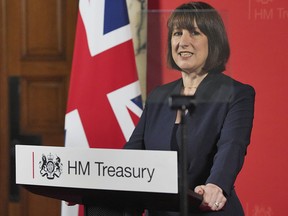Article content
Chancellor Rachel Reeves will meet bosses of big pension schemes in Toronto on Wednesday, as she seeks to create a “Canadian-style” model in the United Kingdom with massive retirement funds investing in equities and infrastructure.
Reeves wants to unlock the investment potential of the £360 billion local government pension scheme, which has more than 6 million members but is fragmented into 86 individual funds in England and Wales.
Article content
If it were a single fund, it would rank among the top 10 biggest funds in the world. Reeves wants the U.K. market to achieve the scale of the megafunds operated in Canada by the so-called Maple 8.
“The size of Canadian pension schemes means they can invest far more in productive assets like vital infrastructure than ours do,” the chancellor said on Tuesday. Achieving this consolidation is a key challenge for Reeves.
Former Conservative chancellor Jeremy Hunt also wanted to build a Canadian-style pensions model in Britain, but progress had been slow.
Reeves has announced a review, overseen by the new pensions minister Emma Reynolds, to look into how to achieve scheme consolidation and put pension funds to use in promoting U.K. growth.
An ally of the chancellor said a new pensions schemes bill would create a “value for money framework” to promote better outcomes for savers.
Reeves has so far not supported “mandating” U.K. funds to invest in certain asset classes. Her allies said there was a “live debate” on the issue, but noted the fiduciary duty on schemes to invest on behalf of their members.
Article content
While in opposition last year, Reeves said regulators could intervene to force the merger of smaller schemes. She said she believed retirement plans with less than £200 million in assets may be failing in their fiduciary duty to savers. “It’s hard to see how some of the smallest funds are delivering value for money,” she said then.
But translating the Canadian model, which includes the Ontario Teachers’ Pension Plan and Caisse de dépôt et placement du Québec, may not be the panacea envisaged by politicians across the political divide in the U.K.
Canada’s Maple 8 funds are noted for their deployment of assets into infrastructure schemes across the world and Reeves has shied away from the idea of compelling U.K. funds to invest in Britain.
Their investment in “productive assets” has not always gone smoothly. In May, a Singapore-registered subsidiary of Ontario Municipal Employees Retirement System that held a 31 per cent stake in Thames Water wrote off its investment in the troubled utility.
But Reeves told a round table of United States investors in New York on Tuesday that she wanted to see pension fund assets used to buy listed and unlisted equities as well as to back infrastructure projects, offering better returns to savers.
Article content
“I want British schemes to learn lessons from the Canadian model and fire up the U.K. economy, which would deliver better returns for savers and unlock billions of pounds of investment,” she said.
Reeves will also meet Mark Carney, former Bank of England governor, in Toronto to discuss how best to deploy investment in Britain’s clean technology sector.
Meanwhile, the chancellor revealed that her set piece City of London speech at Mansion House in the autumn will focus on the partnership she wants to see between government, industry and regulators to deliver growth.
Separately, Reeves has in effect ruled out using her Budget in October to change the rules so that pensioners working beyond the state retirement age of 66 should pay national insurance contributions.
The idea has been mooted as a way for the chancellor to close a hole in the public finances but Reeves, speaking on her visit to the U.S. and Canada, said there were “no plans” to make pensioners pay NICs.
Allies of the chancellor said that in this case “no plans” meant she would not make the change because it would defeat her objective of keeping people in the workplace.
© 2024 The Financial Times Ltd
Share this article in your social network




